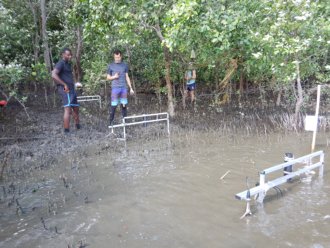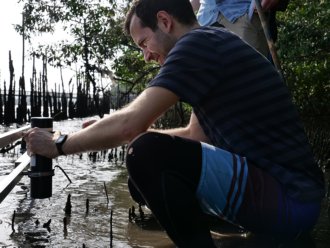Nature-based Coastal Engineering
My name is Erik Horstman, and I am researching nature-based solutions for coastal engineering. These solutions can increase the resilience and safety of coastal zones in the face of the escalating impacts of climate change. The combination of field observations and numerical simulations of the dynamics of such nature-based solutions is crucial to the successful implementation and management of these systems.
Background
My work pioneers investigating the dynamics of and interactions between the ecological and geophysical systems in coastal mangrove ecosystems. Through numerous multi-disciplinary field campaigns in mangroves around the world (Singapore, Thailand, New Zealand, Curaçao), I have developed new knowledge on the movement of water and sediments in these ecosystems, including the interactions of these dynamics with the mangrove vegetation.
These observations have been instrumental for the development of numerical models that I use to investigate the (future) development of coastal wetlands under changing environmental conditions. Together with PhD students and a PostDoc, I am currently working on the integration of several state-of-the-art numerical models to develop an integrated mangrove dynamics model that can predict both the ecological and geophysical development of mangroves over time spans of years to decades. Sensitivity analyses with this model will provide key information for increasing the success of mangrove management and restoration efforts.
As the world around us is changing rapidly and solutions from the past cannot protect us from the threatening flood disasters of today and tomorrow, nature-based engineering solutions have an innate resilience that provides important benefits compared to traditional hard engineering infrastructure. These solutions can mitigate and adapt to changing environmental conditions and, more importantly, also enable developing countries to implement flood protection strategies. That is why I believe that nature-based flood protection strategies are the way forward towards resilient coastal ecosystems and communities globally.
Through my research, I strive to quantifying the contribution of mangroves to coastal protection and resilience. In the Mangrove-RESCUE project (which was awarded a VENI grant in 2017), I use the enhanced system understanding of mangrove ecosystems to quantify their contributions to the lowering of waves and storm surges as well as their capacity to adapt to rising sea levels, enhancing the safety of coastal communities now and in the future.
In the years to come

In the Resilience of the Richest Reefs project (which was awarded an WUR-INREF grant in 2021), I will further investigate the filtering function of the mangroves which protects coastal waters and coral reefs from (effluent of) human activity in the coastal zone. The integrated system approach of my research allows for a full appreciation of the potential contribution of coastal mangrove ecosystems to coastal zone management to benefit both nature and society.
Through my research, I intend to contribute to safe and sustainable coastal communities. I hope to enhance our fundamental understanding of the resilience of mangrove ecosystems and their contributions to coastal safety. By sharing and communicating this knowledge with all stakeholders involved, I want to support the restoration and management of mangrove ecosystems and to advance the implementation of nature-based coastal engineering solutions around the world.
Education
I teach the Building with Nature MSc programme, which is dedicated to the understanding, design, implementation and monitoring of nature-based coastal engineering solutions. I am also teaching in and coordinating the Civil Engineering BSc module Introduction to Civil Engineering. This module teaches first-year students about the basics of, amongst others, urban water management and traditional and nature-based water management solutions.
Collaborations
For my research I (have) collaborate(d) with many (international) partners, such as the National University of Singapore, National Parks (Singapore), National Institute of Water & Atmospheric Research (New Zealand), the University of Waikato (New Zealand), Southern Cross University (Australia), Carmabi (Curaçao), Mangrove Maniacs (Bonaire), the Mangrove Action Project (USA), Wageningen University & Research (Netherlands), the Royal Netherlands Institute for Sea Research and Deltares (Netherlands).

